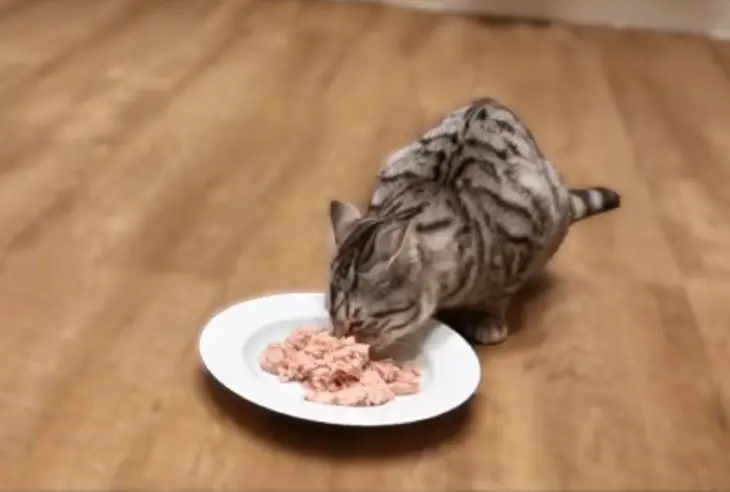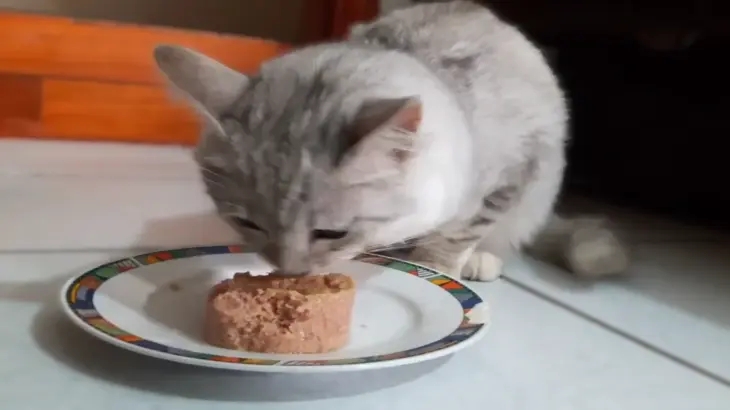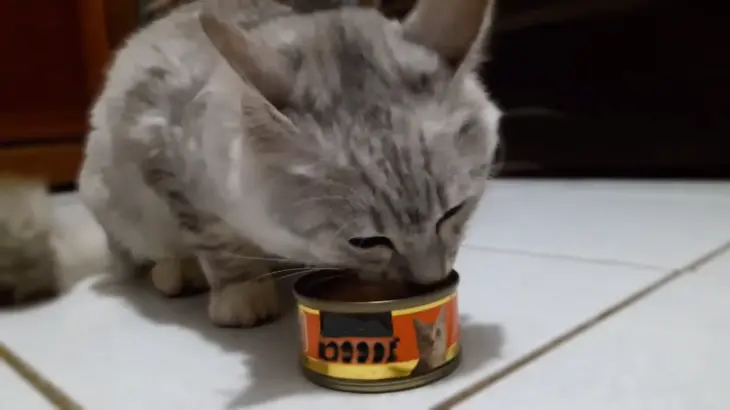Can Cats Eat Tuna? What You Should Know
Yes, cats can eat tuna in moderation as an occasional treat. Light tuna is safer than albacore tuna. Feed only about 1-2 teaspoons per 5 lbs. of body weight.
By: Lana Koh

The information in this article is intended to educate cat parents and is not a substitute for veterinary guidance. In case of any concerns about your cat’s health, please talk with your veterinarian.
Cats crave tuna as much as humans crave their favorite dish. However, that does not mean you should place tons of tuna in front of cats and let them feast on it. Tuna for people differs from cat food tuna and can lead to malnutrition, mercury poisoning, and other issues if fed long-term. Though not toxic, human tuna offers little nutritional value for cats, so it’s better kept as an occasional treat only.
Always remember that while tuna contains a good amount of protein, it lacks minerals and vitamins equal to the amount required for a cat’s growth. This can lead to malnutrition and various diseases.
Click to read: Can Cats Eat Chocolate?
If you are wondering how much tuna can be given to cats, what its benefits and risks are, and if you have any other questions in mind, then let’s explore this article in depth. I hope it answers all your queries regarding whether cats can eat tuna.
Do Cats Like Tuna?

Many cats love the strong scent and flavor of tuna. The fishy smell draws them in. And the taste keeps them coming back for more. While tuna is not toxic, human-grade tuna lacks the nutrients cats need. Eating it often can cause vitamin deficiencies over time. It’s best to stick to complete cat foods.
Guidelines For Feeding Tuna To Your Cat

Tuna tastes good to cats but misses the vitamins cats need. Giving too much tuna can cause sickness from mercury or lack of nutrients. For safe treats, give only 2 spoons of light tuna weekly, which has less mercury.
To make tuna treats safe, cat parents should follow some practical tips.
- Choose Tuna Canned In Water. Avoid versions canned in oil or brine, which can cause stomach upsets.
- No Salt Or Seasonings. Only feed tuna free from any added salt, spices, or flavorings. These seasonings and preservatives can harm cats.
- Select Tuna Carefully. Certain tuna contain higher mercury levels, so research brands and types carefully before feeding cats.
- Treat Tuna As An Occasional Snack. To limit mercury and nutritional issues, tuna should be a very small part of a cat’s diet.
- Watch For Food Intolerances. Tuna can cause stomach troubles for some cats. If symptoms arise, discontinue feeding tuna.
- Ensure Proper Daily Nutrition. While tuna brings happiness in small treats, balanced commercial cat food should provide the bulk of feline nutrition.
- Consult Your Veterinarian. Always discuss any dietary changes, including tuna treats, with your cat’s veterinarian first.
Following these practical tips allows cats to enjoy tuna’s flavor safely while ensuring overall nutritional needs are met. A tuna treat here and there brings joy without endangering cats’ health.
Is Tuna Good Or Bad For Cats?
If I talk about its beneficial aspects, tuna contains omega-3 oils and vitamin B12 which makes it a healthy treat. But too much of that good thing can turn bad. So, relying only on tuna doesn’t give cats all the nutrients they need.
Regarding some concerning areas, too much tuna can cause mercury to build up. That’s no good! So, if you want to share some tuna with your cats, just a little bit is enough.
Health Benefits Of Tuna For Cats
Tuna is good for cats. It contains minerals like calcium, zinc, and potassium. It also has protein, healthy fats, and B vitamins. Tuna has nutrients that contribute to a cat’s health and activity. How tuna impacts on cat’s health, let’s read it in detail.
Tuna Helps Maintain A Healthy Weight
Fresh or water-packed canned tuna is low-calorie, high-protein, with little fat or carbs. Replacing 10% of a cat’s meals with tuna can aid healthy weight gain.
Tuna May Improve A Cat’s Appetite
Amino acids like lysine and taurine are naturally present in Tuna and improve that cat’s appetite. Adding a bit of tuna to your cat’s food, either as a topper or mixed in, can make it more appealing.
Tuna Can Help Administer Medications
As cats crave Tuna, if you have to administer any tablet or any other medication, you can do so by coating a tablet with tuna or hiding it inside can distract your cat so they swallow the pill unaware.
Tuna Can Fight Inflammation
Due to Inflammation, many diseases like arthritis, digestive issues, heart disease, and more arise. Tuna has high levels of Omega-3 fatty acids, which reduce inflammation. It can also lower cholesterol.
What are the Health Risks of Feeding Canned Tuna to Cats?

Tuna contains high mercury levels that can damage cats’ kidneys and cause failure. Mercury poisoning also leads to neurological and digestive issues. In some cases, cats have tuna allergies with symptoms like skin or stomach problems. So, it is best to feed cats balanced foods with key nutrients. Let’s have a look at some of the major threats using canned tuna to cats.
Tuna Contains Mercury
Cailin Heinze, an animal nutrition expert at Tufts University, cautions that tuna contains high levels of mercury, which can be dangerous for cats. Also, Albacore tuna has three times more mercury than chunk-light. So, too much tuna leads to mercury poisoning, causing dizziness, lack of balance, and other problems.
Cats Can Have Food Allergies
Tuna contains protein and some additives like stabilizers that can induce allergy signs if giving your cat tuna for the first time. These include scratching, skin irritation, hair loss, or stomach upset. More serious reactions like liver, kidney, eye, or pancreas trouble could also signal an allergy.
Cats Can Become Tuna-Obsessed
Certain amino acids like methionine, lysine, and high-fat content in tuna create strong cravings. Due to this cats can become obsessed, refusing other foods pet owners offer. Besides, the high palatability causes euphoric sensations that can hook cats for Tuna.
Tuna Lacks Nutrients And Can Be Unhealthy
Tuna is not a good everyday cat food. It lacks important nutrients like vitamin E, arginine, and taurine that cats need. It also has too much unhealthy fat that can make cats sick over time. This fat causes a vitamin E deficiency, which shows as yellow skin or lack of energy.
Not All Cats Can Stomach Tuna
Even though tuna makes most kitties go crazy, not all cats can stomach it well. Tuna is very rich and fatty. Some cats get belly aches after tuna because their tummy can’t digest all the fish oils and proteins.
Signs of too much tuna can be gas, loose poop, throwing up, or kitty stops eating. So, If your cat already has sensitive digestion or can’t tolerate certain foods, tuna may be a misfit thing.
How Much Tuna Do You Feed Your Cat?
Tuna should only make up 10% of a cat’s daily calories. A few teaspoons weekly, or half a can monthly, is safe as an occasional treat. Too much tuna risks upsetting the digestive system or causing allergies.
Cat Food And Treats With Tuna In Them
Many commercial cat foods and treats contain tuna as an ingredient. While tuna can add appetizing flavor, the mercury levels may be dangerously high if tuna is the primary ingredient. It is safer to choose cat foods where tuna is lower on the ingredients list, not the first ingredient.
Frequently Asked Questions
Conclusion
In short, tuna can be a healthy part of a cat’s diet but should be fed in moderation. Cats love the strong taste and smell of tuna. However, tuna contains higher levels of mercury and other hazardous things than other types of fish.
Consuming too much tuna can lead to mercury poisoning in cats, with symptoms like coordination problems, vision issues, and digestive upset. Also, Tuna lacks balanced nutrition on its own. It is not a complete cat food. So, for the optimal diet, tuna should be limited to an occasional treat.

About the Author
Lana Koh
Lana is a passionate cat lover with years of experience caring for her feline companions. As a dedicated volunteer at animal shelters, she’s gained valuable insights into the world of cats. Lana channels her love and knowledge into writing informative and engaging articles for fellow pet owners, covering topics like cat health, nutrition, grooming, behavior, and the special bond we share with our feline friends.
